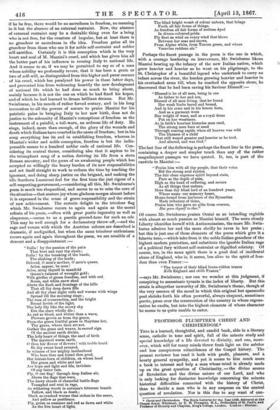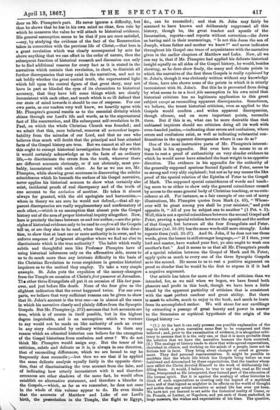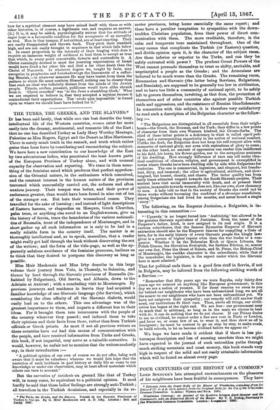PROFESSOR PLUMPTRE'S CHRIST AND CHRISTENDOM.* THIS is a learned, thoughtful,
and candid book, able in a literary sense, catholic in tone and spirit, fall of the minute study and special knowledge of a life devoted to divinity, and one, more- over, which will for many minds throw fresh light on the subtler and less conspicuous coincidences of the Gospel history. The present reviewer has read it both with profit, pleasure, and a hearty general sympathy, and yet it seems to him much more a book to interest and help a man whose mind is already made up on the great question of Christianity, — the divine source of Revelation and the divine nature of our Lord, and who is only looking for distinct,er knowledge concerning the minute historical difficulties connected with the history of Christ, than to decide a man who is in any suspense on the central question of revelation. Nor is this due to any want of can-
• arid and Christendom. The Boyle Lectures for the Year 1866, delivered at the Chapel Royal, Whitehall, by E. H. Plumptre. MA., Prebendary of St. Pad's, and Professor of Divinity and Chaplain, King's College, London. tond on : Strahan dour on Mr. Plumptre's part. He never ignores a difficulty, but then he shows that he has in his own mind no clear, firm rule by which he measures the value he will attach to historical evidence. His general assumption seems to be that if you are once satisfied, —say, by studying the evidence of the fact of the Resurrection taken in connection with the previous life of Christ,—that here is a great revelation which was clearly accompanied by acts far above anything that we can effect in the order of nature, then the subsequent function of historical research and discussion can only be to find additional reasons for every fact as it is stated in the narratives which contain that revelation, in short, to diminish all further discrepancies that may exist in the narratives, and not to ask boldly whether the great central truth, the supernatural light which fell upon the central figure of that great story, may not have in part so blinded the eyes of its chroniclers to historical accuracy, that they have left some things which are clearly inconsistent with each other, and much which is so ill defined that our state of mind towards it should be one of suspense. For our own parts, as our readers very well know, we heartily agree with Mr. Plumptre's general results as to the essential divinity which shines through our Lord's life and words, as to the supernatural fact of His resurrection, and His subsequent self-revelation to St. Paul, on which the whole Christian Church was founded; and we admit that this, once believed, removes all antecedent impro- bability from the miracles of our Lord, and that no one who believes thus much will doubt that the principal and best attested facts of the Gospel history are true. But we cannot at all see that this ought to exempt historical investigation from the duty which it would certainly acknowledge as to the facts of an ordinary life,—to discriminate the errors from the truth, wherever there are different accounts obviously, or if not obviously, most pro- bably, inconsistent with each other. As far as we can see, Mr. Plumptre, while showing great acuteness in discovering the subtler coincidences which lie beneath the surface of his Gospel narrative, never applies his historical acumen to show what certainly also exist, incidental proofs of real discrepancy and of the truth of one account to the exclusion of another. He takes it almost always for granted, with the old apologists and harmonists,— whom in theory we are sure he would not defend,—that all ap- parent discrepancies are really supplementary and confirmatory of each other,—which is an assumption that almost puts the Gospel history out of the area of proper historical inquiry altogether. Now, here is precisely the issue between us and our author,—are the prin- ciples of historical evidence only to be used to confirm all the Gospels tell Us, or are they also to be used, when they point in this direc- tion, to show that at least one or more authority is in error, and to enforce suspense of judgment altogether where we find no clue to discriminate which is the true authority? The habit which really subtle and thoughtful men like Professor Plumptre have of using historical inferences only on the affirmative side, seems to us to do much more than any intrinsic difficulty in the basis of the Christian Revelation to rouse suspicions in genuine historical inquirers as to the method they employ. To take a very simple example. St. John puts the expulsion of the money-changers from the Temple on occasion of Christ'sfirst passover at Jerusalem. The other three Evangelists all put it on occasion of His last pass- over, and just before His death. None of the four give us the slightest indication that the event happened twice. For our own parts, we believe that very sufficient reasons can be given to show that St. John's account is the true one—as in almost all the cases in which his narrative clearly and plainly differs from the Synoptic Gospels. But Mr. Plumptre (p. 272) assumes that both accounts are true, which is of course in itself possible, but in the highest degree improbable, and is an assumption which we venture to say would not be made on like authority of such an event in any story chronicled by ordinary witnesses. Is there any reason which an educated historian can believe for the exemption of the Gospel historians from confusion and error ? We do not think Mr. Plumptre would assign any. But the tenor of his criticism, subtle and delicate as it is, is always in one direction, that of reconciling differences, which we are bound to say he frequently does reconcile ;—but then we see that if he applied the same delicate analysis equally fairly in the opposite direc- tion, that of discriminating the true account from the false, and of indicating how utterly inconsistent with it and therefore erroneous are other shadows of the same fact, he would often establish an alternative statement, and therefore a blunder in the Gospels,—which, as far as we remember, he does not once in the whole of this volume appear to do. He even thinks that the accounts of Matthew and Luke of our Lord's birth, the presentation in the Temple, the flight to Egypt,
&c., can be reconciled ; and that St. John may fairly be assumed to have known and deliberately suppressed all this history, though he, the great teacher and apostle of the Incarnation, reports—and reports without correction—the Jews
as having said in their murmurings, "Is not this Jesus the sou of Joseph, whose father and mother we know ?" and never indicates
throughout his Gospel one trace of acquaintance with the narrative given in the earlier chapters of Matthew and Luke. Now, all we can say is, that if Mr. Plumptre had applied his delicate historical insight equally on all sides of the Gospel history, he would, besides showing, as he does show finely, the many and delicate points in which the narrative of the first three Gospels is really explained by St. John's, though it was obviously written without any knowledge of them, have also shown some of the points in which it is utterly inconsistent with St. John's. But this he is prevented from doing by what seems to us a bond fide assumption in his own mind that historical criticism has no legitimate application to this great subject except as reconciling apparent discrepancies. Sometimes, we believe, the truest historical criticism, even as applied to the Gospels would confirm and widen apparent discrepancies, though oftener, and on more important points, reconcile them. But if this is so, what can be more desirable than that unbiassed inquirers should see criticism doing all its work with even-handed justice, —indicating clear errors and confusions, where errors and confusions exist, as well as indicating substantial con- firmations in the apparent discrepancies where it can do so?
One of the most instructive parts of Mr. Plumptre's interest- ing book is his appendix. But even here he seems to us at times to rest a proof of authenticity on very slender evidence to which he would never have attached the least weight in an opposite direction. The evidence in his appendix for the authority of the generally supposed spurious Second Epistle of Peter, seems to us strong and very ably explained; but not so by any means the like proof of the special relation of the Epistle; of Peter to the Gospel of Mark. The supposed special coincidences of words and teach- ing seem to us either to show only the general coincidence caused by access to the same general body of Christian teaching, or no coin- cidence at all. For instance, as a fair example of one out of many illustrations, Mr. Plumptre quotes from Mark (x. 43), "Whoso- ever will be great among you shall be your minister," and puts opposite it, "All of you be subject one to another" (1 Pet. v. 5). Well, this is not a special coincidence between the second Gospel and Peter, proving a special relation between the apostle and the author of that Gospel, but between all the four Evangelists and Peter. Matthew (xxi. 26-28) has the same words still more strongly. Luke repeats them (xxii. 24-27). And St. John, if he dose not use these words, gives the lesson in still stronger language,—" If I then, your lord and master, have washed your feet, ye also ought to wash one another's feet." And it seems to us that all Mr. Plumptre's proofs of a special relation between the Gospel of Mark and St. Peter, apply quite as much to every one of the three Synoptic Gospels as to the second. He seems to us to rest a positive argument on proof so slender that he would be the first to expose it if it had a negative argument.
Our article has taken far more of the form of criticism than we intended, for, as we said when we began, we have found both pleasure and profit in this book, though we have been a little vexed by the apparent partiality of criticism that is consistent with the most perfect candour and great ability. But there is inueh to admire, much to enjoy in the book, and much to learn from its accomplished author. We will atone for our cavillings by extracting a passage of great beauty and power in answer to the Straussian or mythical hypothesis of the origin of the Gospel history :—
"(1.) At the best it can only present one possible explanation of the. way in which a given narrative came itret to be composed and then believed ; and, prior to the examination of evidence, it is altogether arbb- trary to assume that it is the only one, or that it is more probable than the solution that we have the narrative because the facts occurred. (2.) The analogy of history tends to show that wide-spread expectations, cherished in silence, and working on the minds of a people, issue not is fictions but in facts. They bring about changes of creed or govern- ment. They find personal representatives. It might be possible to, maintain that the whole life which the Gospels bring before us was fashioned and determined by these expectations, that the teacher whom men called the Christ devoted Himself to the work of deliberately ful- filling them. It would, I believe, be true to say that, road as He read them, interpreted as He interpreted, they formed part of the education of His human spirit. But it is against the analogy of other histories to think of such expectations as creating only the legend of a mythical hero, and of that legend as mightier in its effects on the world of thought and action than any actual narrative or actual life has ever yet been. We have not yet learned to set aside the historical reality of Caesar, or St. Francis, or Luther, or Napoleon, and yet each of them embodied, in large measure, the wishes and expectations of his time. The question, how far a mythical element may have mixed itself with these or with other histories, is, of course, a legitimate one, and requires an answer. (3.) It is, it may be added, psychologically untrue that the attitude of eager hope is a favourable condition for the acceptance of an unreality as real. Men in that temper, if not critical, are at least exacting. They are easily disappointed and thrown back. They pitch their standard high, and are not easily brought to acquiesce in that which falls below it. In exact proportion to the intensity of their longing wish does it require an immense weight of evidence to lead them to accept as true that which, in every point conceivable, thwarts and contradicts it. A Christ cunningly devised to meet the yearning expectations of Israel would, have lived a far other life and died a far other death than the Christ of Nazareth. In whatever degree we, taught by facts, may recognize in prophecies and foreshadowings the lineaments of a suffer- ing Messiah,—in whatever measure He may have learnt from them the pattern to which He must conform Himself, nothing can be clearer than that such an ideal was infinitely distant from the minds of the Jewish people. Priests, scribes, peasants, publicans would have alike shrunk from it. 'Christ crucified' was 'to the Jews a stumbling-block.' What we are required to believe is, that they accepted a mythus because it eontaadieted their expectations. The credo quia impossibile ' is forced upon us where we should least have looked for it."
































 Previous page
Previous page